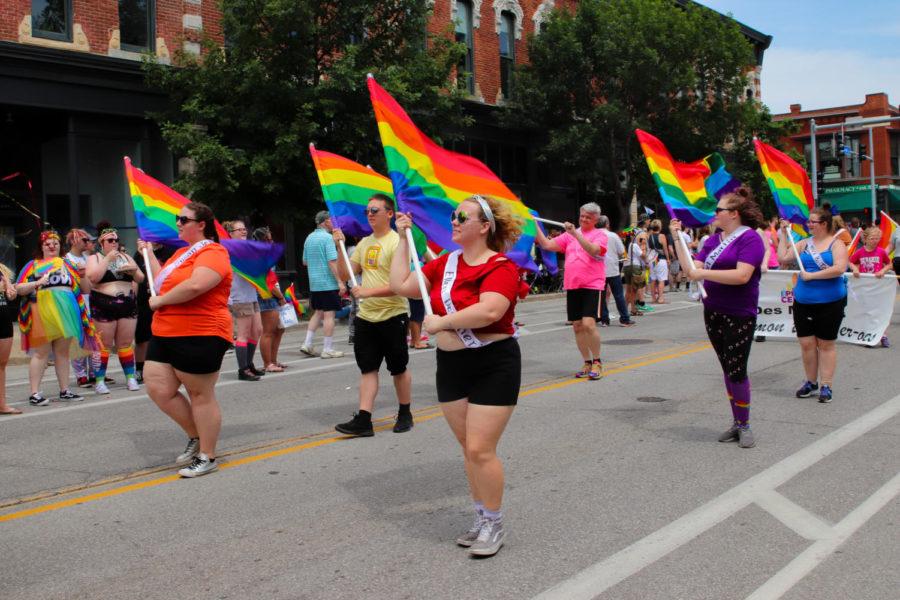Gibbons: How to be a good ally this Pride Month (and every other month)
Grant Tetmeyer/Iowa State Daily
Parade participants perform a flag routine with pride flags during the Des Moines Pride Parade on June 9. The parade started at the Iowa Capitol Building and traveled down Grand Avenue in the East Village.
June 12, 2019
Pride Month can be awkward for non-LGBTQIA+ people to navigate if they want to support the community, but are unsure of how to do so.
This month provides an opportunity to recognize the impact that LGBTQIA+ people have on the world, the struggles and persecution they have faced and continue to face and the need to increase the visibility of the community. Here is a small — and by no means comprehensive — guide on how to be the best LGBTQIA+ ally you can be this Pride Month, and how you can support other marginalized communities year-round.
Listen and educate yourself.
This is the simplest and easiest way to be an ally. Listen to the stories of LGBTQA+ people in your life — don’t interject, don’t play the devil’s advocate, simply sit and listen. The hardest part of being in a marginalized community is that their voices aren’t truly heard.
It is not the job of the oppressed to educate you. It is your job to hear the voices of marginalized people and to learn what has led to current situations.
Confront your privilege.
This is probably the most difficult part of being an ally. When listening to the experiences of marginalized people, recognizing the role you play in that marginalization will likely be difficult. You might want to defend the actions and circumstances that led them to those conclusions, but you can’t shut down. It’s uncomfortable to rethink and relearn so much of what you were taught growing up. You also have to realize that you have done and said things that perpetuate the cycles that hurt certain communities.
Your feelings may be hurt for a while, but considering what these communities have been through, I’m pretty sure you can deal with it. Coming face to face with those uncomfortable situations is the only way to grow.
Use your privilege.
Once you’ve come to terms with your privilege and how you benefit from it, learn how you can use it to help those around you.
Start conversations with people who have your same privileges and make them uncomfortable — urge them to seriously think about it like you have. Participate in public events that might not directly affect you, because your presence makes a difference.
Be intolerant of inexcusable behavior. If you hear someone make an insensitive joke, say something. Jokes play a major role in perpetuating and normalizing a harmful culture, regardless of what community is being targeted, or the joker’s good intentions.
A 2014 study mentioned by Huffpost found that young women consider sexual assault normal. The article cites that a couple of the predominant reasons that young women don’t report sexual violence is that they believe that men “can’t help it,” and that they viewed “everyday harassment and abuse as normal male behavior.”
If someone tells you that something you said or did bothered them as a member of a marginalized community, don’t negate it because you’re an “ally.” Being an ally doesn’t automatically mean you can do no wrong.
When you are called out, you should listen, apologize, take accountability for your actions and change them moving forward. Harmful words and actions — even unintentional ones — damage trust, and while apologizing is an important step in rebuilding that, how you act moving forward shows that you deserve to be trusted.
Remember that “Ally” isn’t a label you get to claim for yourself.
As someone who isn’t part of the marginalized community you are standing in solidarity with, it’s not up to you to determine if you actually are an ally. Your actions are what truly indicate if you are. Being an ally isn’t an identity, but rather a sign of a relationship.
It is up to the community you are trying to support to decide whether or not you are someone who can be trusted. That trust is earned through demonstration.
Surround yourself with a diverse cast of voices.
Start by looking at who you hang out with, the books you read, music you listen to and who you follow on Twitter and Instagram. Seem a bit homogenous? Search out some people of different communities, and genuinely listen to what they have to say.
A great way to start is to diversify your Twitter feed. News spreads quickly on Twitter, and hearing how people from a wide variety of backgrounds react and feel about current events is a great way to continually educate yourself.
Donate your time or money
There is an incredible amount of organizations dedicated to helping those who are part of marginalized communities through education, public outreach and organization, shelters, legal assistance or legislation that you can donate your time or money to.
Volunteering for organizations like these is usually an option; you just need to look into what’s around you. If volunteering is not an option for you, monetary donations also help these organizations continue their important work.
As this month is LGBTQIA+ Pride Month, here are a few notable organizations to look into: Gay and Lesbian Alliance Against Defamation (GLAAD), Gay, Lesbian, and Straight Education Network (GLSEN), the Trevor Project, the Transgender Law Center and the LGBTQ Victory Fund. To learn more about these organizations, Bustle published an article in June of 2018 providing brief descriptions of a few of the nonprofits mentioned.
















